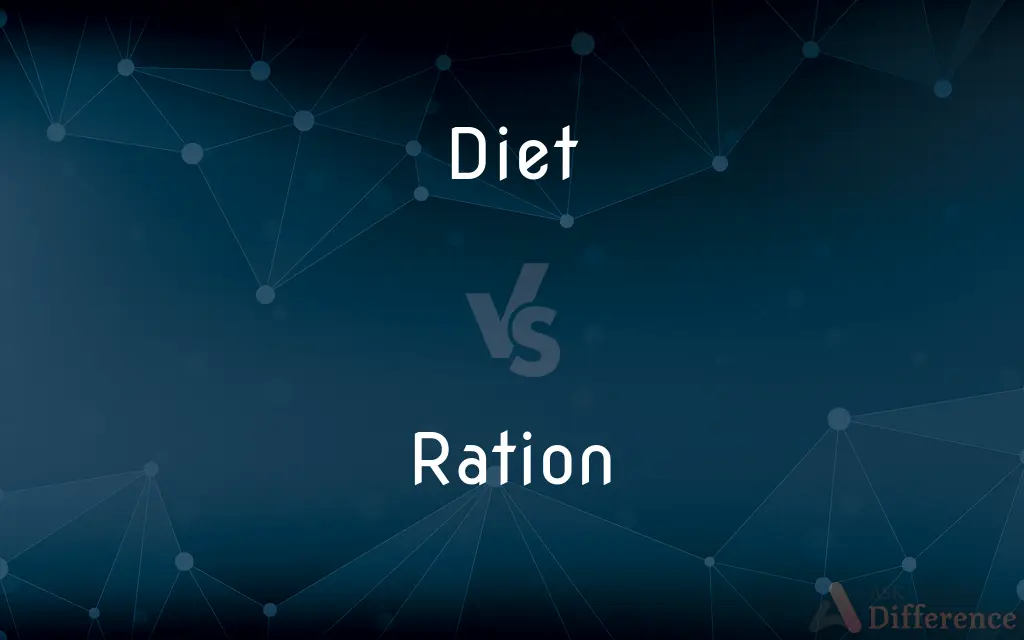Diet vs. Ration — What's the Difference?
By Urooj Arif & Fiza Rafique — Updated on April 19, 2024
A diet encompasses the total variety of foods consumed regularly for health or cultural reasons, whereas a ration is a fixed allowance of provisions or food, often for a specific purpose or limited period.

Difference Between Diet and Ration
Table of Contents
ADVERTISEMENT
Key Differences
A diet generally refers to the habitual intake of food and drink by an individual or group, with particular attention to nutritional content and health objectives. It often connotes a deliberate selection of food to control body weight or manage specific health conditions. On the other hand, a ration specifically denotes a fixed amount of food assigned on a daily or periodic basis, especially in controlled or scarce circumstances like military settings, emergencies, or during food scarcity.
Diet is typically a broader term and can be permanent or long-term, reflecting personal choices or cultural habits. It includes all types of eating patterns, from vegetarian and vegan to ketogenic and paleo diets, tailored according to personal health goals, ethical beliefs, or medical advice. Rations, while they also involve food distribution, are characterized by their restrictive nature, intended to ensure survival or meet minimum nutritional standards under specific conditions.
In terms of application, the concept of a diet is commonly used in medical, nutritional, and fitness contexts. It involves recommendations on both what and how much to eat to achieve certain health outcomes, such as lowering cholesterol levels or improving overall heart health. Rations are often discussed in contexts of resource management, where food supply is limited or needs to be distributed equally among a large number of people, such as soldiers during a campaign or civilians in disaster relief scenarios.
The flexibility of a diet allows for modifications and adaptations based on individual needs, preferences, or changing health conditions. Conversely, rations are typically static and unchanging, designed to meet basic nutritional needs without regard to individual preferences or specific health conditions, focusing instead on practicality and sufficiency.
While both terms involve the consumption of food, the implications of each vary greatly. A diet can enhance one’s lifestyle, improve health, or reflect personal values, while a ration is often a temporary measure, imposed out of necessity to manage a limited resource effectively.
ADVERTISEMENT
Comparison Chart
Definition
Customary food intake, often health-oriented
Fixed allowance of food, often for survival
Context
Health, lifestyle, cultural
Military, emergencies, resource scarcity
Flexibility
Adaptable to individual needs
Fixed and uniform
Duration
Long-term or permanent
Typically temporary
Focus
Nutritional content, preferences
Meeting basic nutritional needs
Compare with Definitions
Diet
The sum of food consumed by a person or other organism.
His diet consists mainly of vegetables and grains.
Ration
A fixed allowance of provisions or food, especially for soldiers or sailors or for civilians during a shortage.
During the expedition, each member received a daily ration of water and dried meat.
Diet
Any regular course of eating and drinking adopted by a person or animal.
This diet helps athletes maximize their performance.
Ration
An amount of food supplied on a regular basis, especially in military contexts.
Each soldier's ration was carefully calculated to ensure enough energy for the day.
Diet
The foods eaten, as by a particular people or group.
The traditional Japanese diet features fish and rice.
Ration
The amount of food allowed to each person during a particular time.
The refugees received their rations for the week.
Diet
A particular selection of food, especially as designed or prescribed to improve a person's physical condition or to prevent or treat a disease.
A heart-healthy diet is rich in fruits, vegetables, and whole grains.
Ration
To distribute as rations.
The government began to ration gasoline during the crisis.
Diet
The usual food and drink of a person or animal.
Ration
To restrict the consumption of a particular resource.
They had to ration their food to survive until rescue.
Diet
A national or local legislative assembly in certain countries, such as Japan.
Ration
To supply with rations.
Diet
A formal general assembly of the princes or estates of the Holy Roman Empire.
Ration
To distribute as rations
Rationed out flour and sugar.
Diet
A regulated selection of foods, as for medical reasons or cosmetic weight loss.
Ration
A fixed portion, especially an amount of food allotted to persons in military service or to civilians in times of scarcity.
Diet
Something used, enjoyed, or provided regularly
Subsisted on a diet of detective novels during his vacation.
Ration
Rations Food issued or available to members of a group.
Diet
Of or relating to a food regimen designed to promote weight loss in a person or an animal
The diet industry.
Ration
To restrict to limited allotments, as during wartime
Ration gasoline.
Diet
Having fewer calories.
Ration
A portion of some limited resource allocated to a person or group.
Diet
Sweetened with a noncaloric sugar substitute.
Ration
(transitive) To supply with a ration; to limit (someone) to a specific allowance of something.
We rationed ourselves to three sips of water a day until we were rescued.
Diet
Designed to reduce or suppress the appetite
Diet pills.
Diet drugs.
Ration
(transitive) To portion out (especially during a shortage of supply); to limit access to.
By the third day on the raft, we had to ration our water.
Diet
To eat and drink according to a regulated system, especially so as to lose weight or control a medical condition.
Ration
(transitive) To restrict (an activity etc.)
Our present health care system is rationed only to those who can afford it because of unnecessary high cost, lack of insurance coverage by 47 million people, and exorbitant prescription prices.
Diet
To regulate or prescribe food and drink for.
Ration
A fixed daily allowance of provisions assigned to a soldier in the army, or a sailor in the navy, for his subsistence.
Diet
The food and beverage a person or animal consumes.
The diet of the giant panda consists mainly of bamboo.
Ration
Hence, a certain portion or fixed amount dealt out; an allowance; an allotment.
Diet
(countable) A controlled regimen of food and drink, as to gain or lose weight or otherwise influence health.
Ration
To supply with rations, as a regiment.
Diet
(by extension) Any habitual intake or consumption.
He's been reading a steady diet of nonfiction for the last several years.
Ration
The food allowance for one day (especially for service personnel);
The rations should be nutritionally balanced
Diet
(usually capitalized as a proper noun) A council or assembly of leaders; a formal deliberative assembly.
They were given representation of some important diet committees.
The National Diet of Japan
Ration
A fixed portion that is allotted (especially in times of scarcity)
Diet
(Scotland) A session of exams
Ration
Restrict the consumption of a relatively scarce commodity, as during war;
Bread was rationed during the siege of the city
Diet
The proceedings under a criminal libel.
Ration
Distribute in rations, as in the army;
Cigarettes are rationed
Diet
(Scotland) A clerical or ecclesiastical function in Scotland.
A diet of worship
Diet
(of a food or beverage) Containing less fat, salt, sugar, or calories than normal, or claimed to have such.
Diet soda
Diet
Having certain traits subtracted.
You folks reduce it to the bible only as being authoritative, impoverishing the faith. "Christianity Lite", diet Christianity for those who can't handle the Whole Meal.
Diet
(transitive) To regulate the food of (someone); to put on a diet.
Diet
(intransitive) To modify one's food and beverage intake so as to decrease or increase body weight or influence health.
I've been dieting for six months, and have lost some weight.
Diet
(obsolete) To eat; to take one's meals.
Diet
To cause to take food; to feed.
Diet
Course of living or nourishment; what is eaten and drunk habitually; food; victuals; fare.
Diet
A course of food selected with reference to a particular state of health; prescribed allowance of food; regimen prescribed.
To fast like one that takes diet.
Diet
A legislative or administrative assembly in Germany, Poland, and some other countries of Europe; a deliberative convention; a council; as, the Diet of Worms, held in 1521.
Diet
To cause to take food; to feed.
Diet
To cause to eat and drink sparingly, or by prescribed rules; to regulate medicinally the food of.
She diets him with fasting every day.
Diet
To eat; to take one's meals.
Let him . . . diet in such places, where there is good company of the nation, where he traveleth.
Diet
To eat according to prescribed rules; to ear sparingly; as, the doctor says he must diet.
Diet
A prescribed selection of foods
Diet
A legislative assembly in certain countries (e.g., Japan)
Diet
The usual food and drink consumed by an organism (person or animal)
Diet
The act of restricting your food intake (or your intake of particular foods)
Diet
Follow a regimen or a diet, as for health reasons;
He has high blood pressure and must stick to a low-salt diet
Diet
Eat sparingly, for health reasons or to lose weight
Common Curiosities
Can a diet include rations?
Yes, in certain contexts like military training or specific dietary programs, a diet may be composed of pre-measured rations to meet particular nutritional or operational requirements.
How are rations determined?
Rations are typically determined by necessity, available resources, and the need to ensure equitable distribution under restricted conditions.
What makes a diet effective for health improvement?
An effective diet is well-balanced, tailored to individual nutritional needs, and sustainable over the long term.
Is a diet always related to health?
While often health-related, diets can also reflect personal beliefs, cultural practices, or ethical choices, such as vegetarianism.
Are rations meant to be permanent?
Rations are generally temporary measures used during emergencies, shortages, or in controlled settings like the military.
What are common types of diets?
Common types of diets include ketogenic, vegan, Mediterranean, and low-carb, each with specific guidelines and goals.
Why might someone choose to follow a specific diet?
Reasons vary widely and can include managing health conditions, losing weight, ethical beliefs, or simply personal preference.
What is the primary difference between a diet and a ration?
A diet refers to regular food habits or medically advised eating patterns, while a ration is a fixed allowance provided especially during shortages or for specific groups like the military.
What role does a dietitian play in diet planning?
Dietitians play a crucial role in assessing individual needs, planning meals, and providing guidance to ensure dietary choices support health and wellness goals.
How do cultural differences affect diets?
Cultural differences significantly influence dietary choices and habits, determining what, when, and how people eat in different parts of the world.
How are rations distributed during a natural disaster?
During natural disasters, rations are distributed by relief organizations or government agencies to ensure survivors have access to essential food and water.
Can anyone be put on a ration system?
While anyone can be subjected to rationing during specific circumstances, it is most common in situations of scarcity or for specific groups like military personnel.
What is a key factor in the success of a dietary plan?
Key factors include the plan's nutritional balance, its adaptability to individual lifestyles, and its ability to meet specific health goals effectively.
What happens if a ration does not meet nutritional needs?
If a ration fails to meet nutritional needs, it can lead to health issues like malnutrition, which is why rations are carefully planned to cover basic nutritional requirements.
How does rationing affect morale in military or emergency scenarios?
Rationing can impact morale by either providing stability and security through guaranteed food supplies or causing stress if rations are insufficient or monotonous.
Share Your Discovery

Previous Comparison
Cerebellar vs. Cerebral
Next Comparison
Storyboard vs. ScriptAuthor Spotlight
Written by
Urooj ArifUrooj is a skilled content writer at Ask Difference, known for her exceptional ability to simplify complex topics into engaging and informative content. With a passion for research and a flair for clear, concise writing, she consistently delivers articles that resonate with our diverse audience.
Co-written by
Fiza RafiqueFiza Rafique is a skilled content writer at AskDifference.com, where she meticulously refines and enhances written pieces. Drawing from her vast editorial expertise, Fiza ensures clarity, accuracy, and precision in every article. Passionate about language, she continually seeks to elevate the quality of content for readers worldwide.
















































